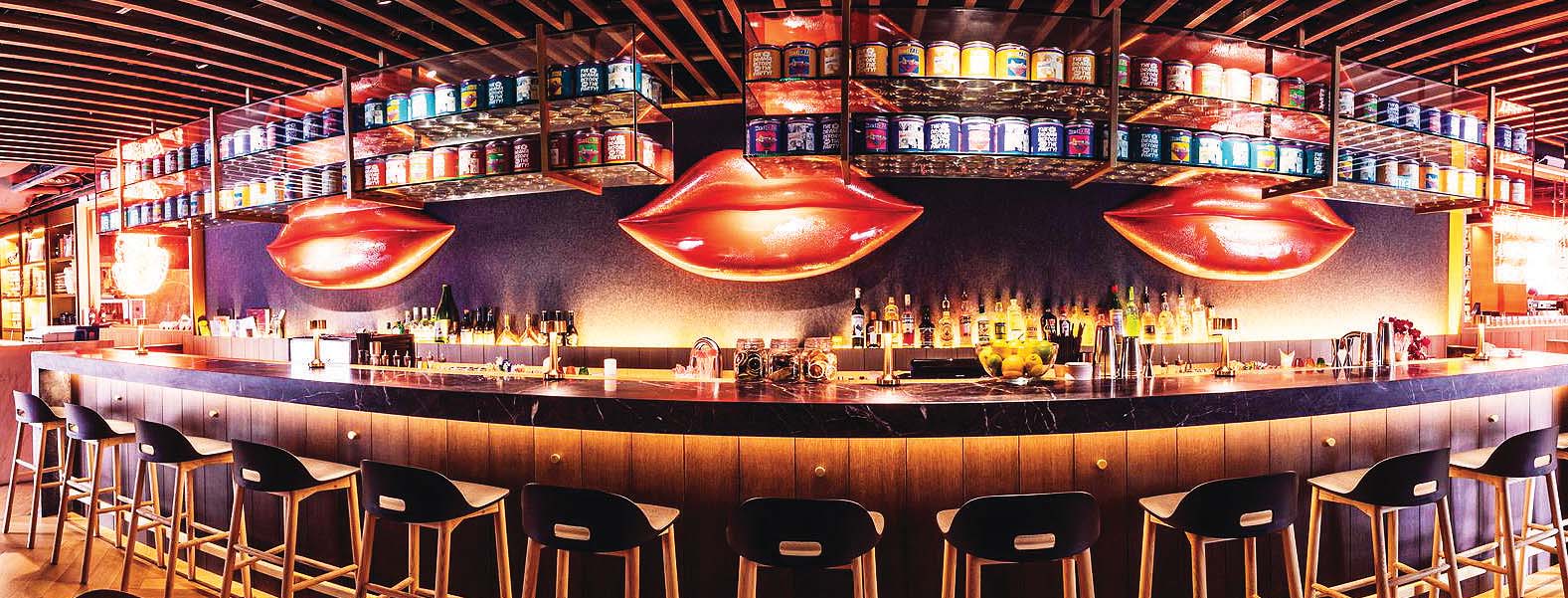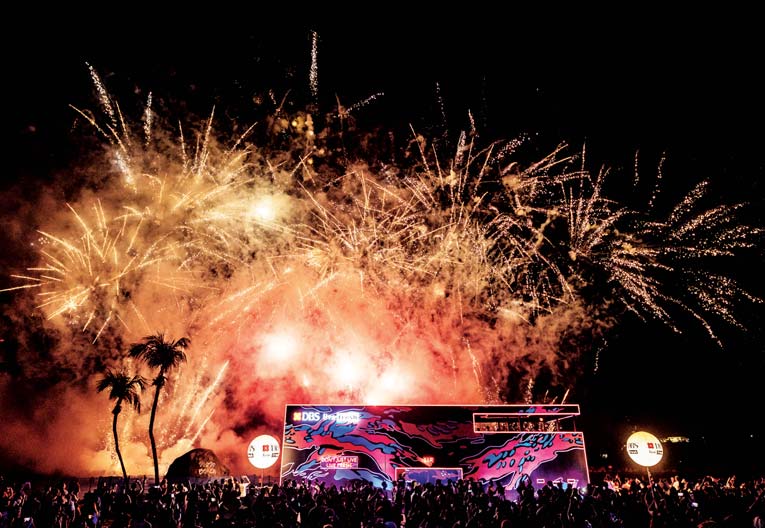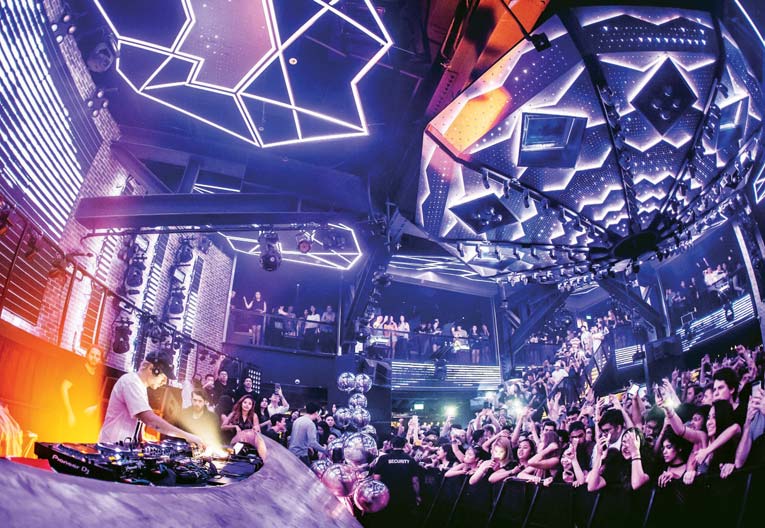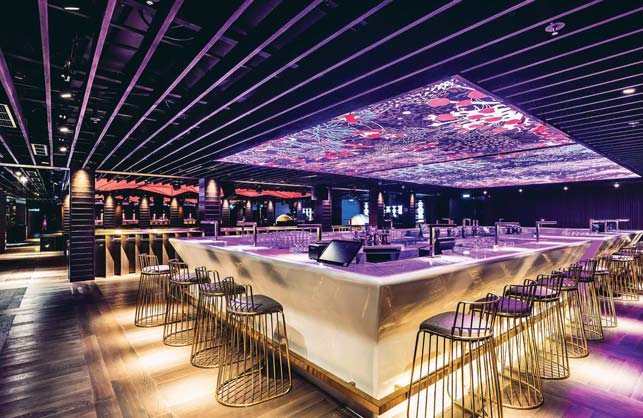
 ZoukOut Singapore returns to Siloso Beach in its 18th edition on Dec 1. Image: Colossal Photos
From Singapore to the world
At past noon, we are nursing bottles of Fiji water in the brightly lit, empty Capital on the second floor — a rare and rather bizarre sight for frequent patrons who have only visited the space for its whisky bar and glamorous themed parties.
Even as a relatively new concept, Capital is still undergoing transformative works. The private whisky room is being converted into a speakeasy, exclusive to selected club members and guests, explains Li, who expects it to be launched in a couple of months. “We brought on a senior bartender to create a more bespoke experience and guests will be able to try hard-to-get tequilas, bourbons and whiskeys here. It’s going to be very personal yet educational,” he divulges.
The reopening of Zouk Singapore at Clarke Quay was only the first of several projects undertaken by the new management team headed by Li. In what he describes as a “natural progression” after the acquisition, Zouk clubs were brought aboard Genting Hong Kong’s Dream Cruises line, namely the Genting Dream and World Dream vessels, in 2016. A lineup of customised, millennial-focused projects under the Zouk brand are also currently in the works for the first of Dream Cruises’ Global-class newbuilds, for which construction commenced in March this year.
Later in 2018, the brand is set to launch its Genting complex in Malaysia that will comprise, among others, its very first restaurant. This follows the success of another RedTail Bar by Zouk outlet, which opened its doors at Resorts World Genting in January. “We might open a Zouk restaurant in Singapore as well; it’s only a matter of time. But for now, we are mainly using Genting as a test bed to try out the concepts,” says Li.
His vision does not end at Genting and Singapore. For the longer term, the group is exploring development opportunities at close to 100,000 sq ft of real estate in Las Vegas, where Li hopes to launch a nightclub by 2022 — and possibly even a hotel to complete the entire portfolio of Zouk-branded entertainment, F&B and hospitality offerings.
ZoukOut Singapore returns to Siloso Beach in its 18th edition on Dec 1. Image: Colossal Photos
From Singapore to the world
At past noon, we are nursing bottles of Fiji water in the brightly lit, empty Capital on the second floor — a rare and rather bizarre sight for frequent patrons who have only visited the space for its whisky bar and glamorous themed parties.
Even as a relatively new concept, Capital is still undergoing transformative works. The private whisky room is being converted into a speakeasy, exclusive to selected club members and guests, explains Li, who expects it to be launched in a couple of months. “We brought on a senior bartender to create a more bespoke experience and guests will be able to try hard-to-get tequilas, bourbons and whiskeys here. It’s going to be very personal yet educational,” he divulges.
The reopening of Zouk Singapore at Clarke Quay was only the first of several projects undertaken by the new management team headed by Li. In what he describes as a “natural progression” after the acquisition, Zouk clubs were brought aboard Genting Hong Kong’s Dream Cruises line, namely the Genting Dream and World Dream vessels, in 2016. A lineup of customised, millennial-focused projects under the Zouk brand are also currently in the works for the first of Dream Cruises’ Global-class newbuilds, for which construction commenced in March this year.
Later in 2018, the brand is set to launch its Genting complex in Malaysia that will comprise, among others, its very first restaurant. This follows the success of another RedTail Bar by Zouk outlet, which opened its doors at Resorts World Genting in January. “We might open a Zouk restaurant in Singapore as well; it’s only a matter of time. But for now, we are mainly using Genting as a test bed to try out the concepts,” says Li.
His vision does not end at Genting and Singapore. For the longer term, the group is exploring development opportunities at close to 100,000 sq ft of real estate in Las Vegas, where Li hopes to launch a nightclub by 2022 — and possibly even a hotel to complete the entire portfolio of Zouk-branded entertainment, F&B and hospitality offerings.
 At its new home at Clarke Quay, Zouk Singapore offers three thematic bars, three VIP pods, a solid DJ console against a glowing LED backdrop and a dance floor. Image: Colossal Photos
Where the heart is
A career in the nightlife industry has taught Li to be more selective while imbibing, especially in situations where he has to do “work drinking”. While he claims to have had the ability to “pretty much drink everything” in his 20s, he now avoids mixing spirits or binge drinking to stay on top of his game the next day. Personally, he enjoys the occasional glass of Bordeaux wine and whenever he is at Zouk, Don Julio 1942 Tequila as a shot or on the rocks.
At just 35 years old, Li already has a handful of C-suite years under his belt, his last role prior to Genting Hong Kong being chief operating officer of Privé Group in Hong Kong. But make no mistake — this high-flyer has definitely earned his stripes, having worked his way up since his days as a room service waiter at COMO Metropolitan London before enrolling into a management trainee programme at Four Seasons Hotel Hong Kong.
Li’s colourful job history includes bartending in Bangkok and teaching archery as a sports instructor for Club Med in Phuket. He also studied Chinese in Beijing for a period of time — although he claims his fluency in Mandarin, Cantonese and Thai are quite rusty at the -moment from the lack of practice — and holds a Bachelor of Applied Science majoring in Psychology from Durham University. He moved to Singapore in March last year after spending his first two years at the company shuttling between Singapore and Hong Kong, where he resided.
Beyond his hours at the Zouk office and visiting the nightclub, usually over weekends, he also somehow manages to train eight to nine hours a week as an ironman triathlon competitor. Li shares that his next competition will be at the Ironman 70.3 Asia-Pacific Championship held this month in Cebu, Philippines. It will mark his fifth triathlon race to date. And as if all that was not enough, Li also finds time to cook about four times a week — a hobby that he finds “de-stressing”. He also tries to sleep at least seven hours each night.
One of the first big life decisions Li made after moving in to his River Valley apartment, where he lives alone, was to become a first-time dog owner. “I named her Chizu (“cheese” in Japanese) as I love eating cheese,” he says fondly of his furkid, a Maltese breed. “I’ve never had so much joy as having a pet. She’s also the official mascot of Zouk. I’ve always wanted a dog but didn’t have one in Hong Kong because there was no space for it.”
After spending years of his life travelling and working in various countries and cities, it seems Li is happy to remain in Singapore for the long term. In fact, he has just applied for permanent residency status here.
“I’ve actually settled in very quickly in Singapore. People say it’s hot here, but I don’t mind that. I can’t be happier living here. They say it’s the number one expat country to live in and I totally agree. It’s amazing,” marvels Li, who waxes lyrical about everything from the city state’s infrastructure and space planning, to its living standards and culture of automation.
Needless to say, Singapore’s nightlife culture is also particularly endearing to him for the very fact that it is practically synonymous with Zouk.
“Whenever I’m clubbing in the US or Hong Kong, people talk about it as something that happened at one time and one place, unlike in Singapore where it’s actually part of growing up… People I [have] met in Singapore would talk about Zouk [then at Jiak Kim] and tell me they had their first clubbing experience, or met their first girlfriend or wife there. That, for me, is something very special. It [proves] the fact that the brand itself actually went above and beyond just ‘clubbing’ and instead became part of people’s lives as they transitioned from their teenage years to adulthood.”
And whether it is Las Vegas or the high seas, no matter how far Genting Hong Kong plans to take the brand expansion, Li believes Zouk will always remain a uniquely Singaporean brand. “The concepts may be different now, but Singapore is really where the brand grew up. And it’s a magical experience that all started here.”
At its new home at Clarke Quay, Zouk Singapore offers three thematic bars, three VIP pods, a solid DJ console against a glowing LED backdrop and a dance floor. Image: Colossal Photos
Where the heart is
A career in the nightlife industry has taught Li to be more selective while imbibing, especially in situations where he has to do “work drinking”. While he claims to have had the ability to “pretty much drink everything” in his 20s, he now avoids mixing spirits or binge drinking to stay on top of his game the next day. Personally, he enjoys the occasional glass of Bordeaux wine and whenever he is at Zouk, Don Julio 1942 Tequila as a shot or on the rocks.
At just 35 years old, Li already has a handful of C-suite years under his belt, his last role prior to Genting Hong Kong being chief operating officer of Privé Group in Hong Kong. But make no mistake — this high-flyer has definitely earned his stripes, having worked his way up since his days as a room service waiter at COMO Metropolitan London before enrolling into a management trainee programme at Four Seasons Hotel Hong Kong.
Li’s colourful job history includes bartending in Bangkok and teaching archery as a sports instructor for Club Med in Phuket. He also studied Chinese in Beijing for a period of time — although he claims his fluency in Mandarin, Cantonese and Thai are quite rusty at the -moment from the lack of practice — and holds a Bachelor of Applied Science majoring in Psychology from Durham University. He moved to Singapore in March last year after spending his first two years at the company shuttling between Singapore and Hong Kong, where he resided.
Beyond his hours at the Zouk office and visiting the nightclub, usually over weekends, he also somehow manages to train eight to nine hours a week as an ironman triathlon competitor. Li shares that his next competition will be at the Ironman 70.3 Asia-Pacific Championship held this month in Cebu, Philippines. It will mark his fifth triathlon race to date. And as if all that was not enough, Li also finds time to cook about four times a week — a hobby that he finds “de-stressing”. He also tries to sleep at least seven hours each night.
One of the first big life decisions Li made after moving in to his River Valley apartment, where he lives alone, was to become a first-time dog owner. “I named her Chizu (“cheese” in Japanese) as I love eating cheese,” he says fondly of his furkid, a Maltese breed. “I’ve never had so much joy as having a pet. She’s also the official mascot of Zouk. I’ve always wanted a dog but didn’t have one in Hong Kong because there was no space for it.”
After spending years of his life travelling and working in various countries and cities, it seems Li is happy to remain in Singapore for the long term. In fact, he has just applied for permanent residency status here.
“I’ve actually settled in very quickly in Singapore. People say it’s hot here, but I don’t mind that. I can’t be happier living here. They say it’s the number one expat country to live in and I totally agree. It’s amazing,” marvels Li, who waxes lyrical about everything from the city state’s infrastructure and space planning, to its living standards and culture of automation.
Needless to say, Singapore’s nightlife culture is also particularly endearing to him for the very fact that it is practically synonymous with Zouk.
“Whenever I’m clubbing in the US or Hong Kong, people talk about it as something that happened at one time and one place, unlike in Singapore where it’s actually part of growing up… People I [have] met in Singapore would talk about Zouk [then at Jiak Kim] and tell me they had their first clubbing experience, or met their first girlfriend or wife there. That, for me, is something very special. It [proves] the fact that the brand itself actually went above and beyond just ‘clubbing’ and instead became part of people’s lives as they transitioned from their teenage years to adulthood.”
And whether it is Las Vegas or the high seas, no matter how far Genting Hong Kong plans to take the brand expansion, Li believes Zouk will always remain a uniquely Singaporean brand. “The concepts may be different now, but Singapore is really where the brand grew up. And it’s a magical experience that all started here.”
 Among several notable features of Capital is an illuminated ceiling by Tetsuya Toshima
This article appeared in Issue 842 (Aug 6) of The Edge Singapore.
Subscribe to The Edge now
Among several notable features of Capital is an illuminated ceiling by Tetsuya Toshima
This article appeared in Issue 842 (Aug 6) of The Edge Singapore.
Subscribe to The Edge now











